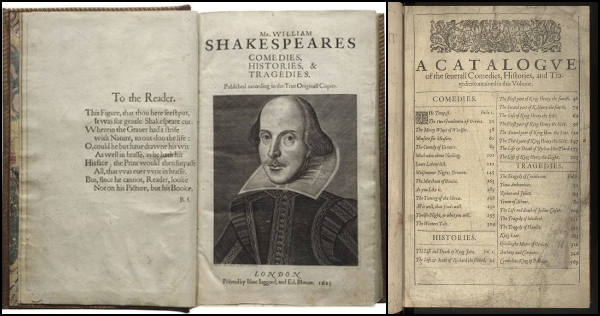Shakespeare's First Folio Anniversary
This year is the 400th anniversary of the printing of Shakespeare's First Folio, which contains 36 plays that it labels as 15 comedies, 10 histories, and 12 tragedies. Some of these have later been called problem plays or romances.
Of the 36 plays, 18 may have been lost forever if not for the printing of the First Folio.
- There are a few others that we know Shakespeare had a hand in that are not included in the First Folio: Two Noble Kinsmen, Pericles, and Edward III.
- There are also lost Shakespeare plays: Love's Labour's Won, and Cardenio.
- And some Folio plays are known to have been collaborations.
The exact date of Shakespeare's birth is not known, although his baptism was recorded as taking place on April 26, 1564, and his death on April 23, 1616. To keep things neat and tidy, his birth and death are observed on the same date, April 23, and this year, the anniversary of the First Folio has attracted special celebrations and publications.
Seven years after Shakespeare died, the First Folio was assembled by John Heminge and Henry Condell, friends of Shakespeare who were also partners in his playing company and fellow actors.
There may have been as many as 750 copies originally printed, of which 235 are currently known to have survived. Of these surviving copies, the Folger Shakespeare Library owns 82, or in other words, more than a third.
If you are interested in this topic, some places to begin research might include some of the following resources:
TWO BOOKS
- Dr. Emma Smith: Shakespeare's First Folio: Four Centuries of an Iconic Book (2018) - follow Dr. Smith on Twitter @OldFortunatus
https://global.oup.com/academic/product/shakespeares-first-folio-9780198819998?cc=us&lang=en&
- Dr. Chris Laoutaris: Shakespeare’s Book:The Intertwined Lives Behind the First Folio (2023) - follow Laoutaris on Twitter: @DrCLaoutaris
https://www.waterstones.com/book/shakespeares-book/chris-laoutaris/9780008238384?awc=3787_1682002346_6df86862b81816f968de532137956017&utm_source=143466&utm_medium=affiliate&utm_campaign=yieldkit
A PLAY
- Colin David Reese has a play, Shakespeare Unbound, about the printing of the First Folio . Follow Colin David on Twitter @Codare786
Follow Colin David on LinkedIn here: https://www.linkedin.com/in/colin-david-reese-23a32257/
and see information on his play here: https://shakespeareunbound.com/
GENERAL RESOURCES:
- British Shakespeare Association roundtable on the First Folio -
(Eric Rasmussen, University of Nevada, Reno, is involved in the digital variorum project especially as it relates to Hamlet, and I spoke with him at SAA-Minneapolis last month.)
https://www.britishshakespeare.ws/bsa-roundtable-on-the-first-folio/
- BBC podcast on the Folio, including comments shortly before and after 39:00 about the use of Shakespeare as a tool for English empire and colonization.
https://www.bbc.co.uk/sounds/play/m001kwyl
- Queen's College, University of Oxford, on Folio400 Day:
https://www.queens.ox.ac.uk/events/folio400-day/
- The Folger Shakespeare Library
https://www.folger.edu/explore/shakespeare-in-print/first-folio/
- The Shakespeare Birthplace Trust
https://www.shakespeare.org.uk/explore-shakespeare/shakespedia/shakespeares-works/shakespeares-first-folio/
- The British Library
https://www.bl.uk/collection-items/shakespeares-first-folio
- University of California-Irvine
https://special.lib.uci.edu/firstfolio
- Wikipedia on First Folio: https://en.wikipedia.org/wiki/First_Folio
It is also good to consider during this 400th anniversary year how Shakespeare was used as a tool of colonialism, expanding the British empire to many lands, subjugating many peoples with the idea that Shakespeare was British, and the best, and all other literature in comparison (in the colonialist view) is inferior.
This doesn't mean Shakespeare would have supported the use of his plays as tools of expanding the British Empire. There are many themes and passages in the plays that indicate he would have opposed it, through his point of view was also conditioned by his culture and time.
For a popular-audience treatment of this subject, see
Emer O’Toole
Shakespeare, universal? No, it's cultural imperialism
The Guardian, May 2012
https://www.theguardian.com/commentisfree/2012/may/21/shakespeare-universal-cultural-imperialism
For more scholarly treatment, see
Leah S. Marcus
How Shakespeare Became Colonial: Editorial Tradition and the British Empire
New York: Routledge, 2017
https://go.gale.com/ps/i.do?id=GALE%7CA561883497&sid=googleScholar&v=2.1&it=r&linkaccess=abs&issn=05829399&p=LitRC&sw=w&userGroupName=anon%7Ed690d78d
What to do about how Shakespeare was used as a tool for empire-expansion and colonization?
Decolonize?
For one treatment of the idea of decolonizing Shakespeare, see
Angela Eward-Mangione
Decolonizing Shakespeare: Race, Gender, and Colonialism in
Three Adaptations of Three Plays by William Shakespeare
University of South Florida
https://digitalcommons.usf.edu/cgi/viewcontent.cgi?article=6819&context=etd
IMAGES:
Left: Introductory poem (by Ben Jonson) to the First Folio
Center: Title page of the First Folio
via The Folger Shakespeare Library, fair use: https://images.folger.edu/uploads/2016/11/TitlePageFirstFolio_005198_small.jpg?fit=500%2C500
Right: Table of Contents from the First Folio, via Wikipedia. Pubic domain. https://en.wikipedia.org/wiki/File:First_Folio,_Shakespeare_-_0017.jpg
~~~~~~~~~~~~~~~~~~~~~~~~~~~~~~~~~~~~~~
~~~~~~~~~~~~~~~~~~~~~~~~~~~~~~~~~~~~~~
Thanks for reading!
~~~~~~~~~~~~~~~~~~~~~~~~~~~~~~~~~~~~~~
~~~~~~~~~~~~~~~~~~~~~~~~~~~~~~~~~~~~~~
My current project is a book tentatively titled Hamlet’s Bible, about biblical allusions and plot echoes in Hamlet.
Below is a link to a list of some of my top posts (“greatest hits”),
including a description of my book project (last item on the list):
https://pauladrianfried.blogspot.com/2019/12/top-20-hamlet-bible-posts.html
I post every week, so please visit as often as you like and consider subscribing.
To find the subscribe button, see the = drop-down menu with three lines in the upper left.


Comments
Post a Comment